How student Aminah Elster liberated herself by giving voice to others
Formerly incarcerated student advocates for the community that changed her life
May 19, 2020
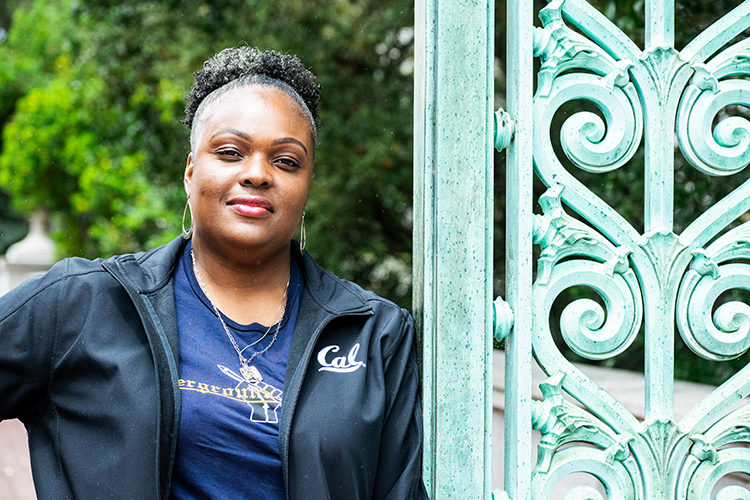
Aminah Elster’s journey as a formerly incarcerated student has brought her from Valley State Prison for Women to California’s senate floor advocating for incarcerated people. (UC Berkeley photo by Irene Yi)
Aminah Elster’s college career began within the walls of a California state prison.
Sitting on a tarp laid in the middle of a Chowchilla prison yard, she completed assignments, studied French and read about the lives of historical figures, like Malcolm X and Frida Kahlo.
Her fellow prisoners circled around the nearby running track, but she took refuge in her own little study nook, away from the negativity and chaos of prison life.
“School was an escape for me,” said Elster. “I was learning new things, and remembering that there was more to the world than those prison walls and the neighborhood that I had been confined to for so long: It was liberating.”
Elster, at the time, was serving 15 years to life as an accessory to murder after an abusive ex-husband forced her to tell the location of her new lover, who was later killed. Now, three years after being paroled, Elster, 42, will graduate from UC Berkeley with a B.A. in legal studies.
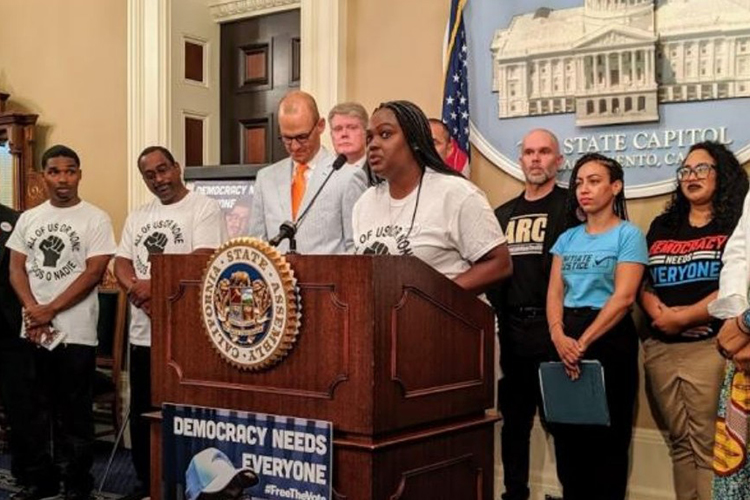
Supported by California legislators, Aminah Elster spoke at the state capitol on August 14, 2019, in favor of ACA 6, a constitutional amendment which will restore the right to vote for Californians on parole. (Photo courtesy of Aminah Elster)
In addition to earning her degree, Elster has become a well-known activist who collaborates with state legislators on policy reform for former and currently incarcerated people.
Berkeley, she said, not only gave her an education and a community of formerly incarcerated students, but also prepared her for a lifetime of advocacy and public service.
“Berkeley has equipped me with the educational capital I needed,” said Elster. “I’m now able to invest in those people who are currently incarcerated and interested in doing research to impact criminal justice policy reform. My goal is to incentivize greater participation in reform strategies while creating leaders of the future.”
As a child and young adult, Elster said she “suffered in silence.” But as both a prisoner and a Berkeley student, she said she has learned to “speak her truth” and has helped other students express themselves in inclusive spaces like workshops and conferences.
“Despite all of the challenges I’ve been through, I know how important it is to push forward,” said Elster. “It’s absolutely important to inspire others to do the same.”
‘Ill-gotten gains’
Living in an abusive household as a child, Elster said she was singled-out by both of her parents because her father didn’t believe she was his biological daughter. The East Oakland native, who loved school, tried to stand out among her four siblings by trying to get good grades and playing point guard for the school basketball team.
“I even participated in the school’s annual bird-calling contest,” said Elster. “The winner would always go on the Jay Leno show. … I was trying to be that ideal daughter that a parent would want. I was doing anything to get recognized.”
But those achievements weren’t valued in her household. At 14, Elster began running with a bad crowd, committing fraud and forging bad checks to make fast money.

A poem written by Elster she shared while in prison. “Is liberation but only a manifestation? / A mirage that propels us toward our destination? / What does it look like, can you tell me how it feels? / Is it as freeing as it sounds, can anyone tell me what’s the deal? / Or are we to forever remain a prisoner, everyday in a different way? / Does liberation trickle through the fingers like water making its escape? / After careful reflection I’ve deduced it’s often sought after, never fully complete. Because once you free your mind, you find there’s still shackles on your feet.”
“They were ill-gotten gains,” she said. “But when I brought that money home, I noticed that it was something my mother responded to and appreciated.”
That lifestyle, though, took a toll on her academics and she did not graduate from high school. A few years later, she met a man from her neighborhood who she would eventually marry. The two had a son together, but her husband became abusive, and controlled her life.
“He had been incarcerated before, so I knew he had a bad reputation. But that’s what drew me to him,” said Elster. “I felt like he would protect me. Those same behaviors, the violence and the jealousy, that I witnessed in my family’s house started playing out in my own relationship. … Everything happened so fast.”
When he violated his parole and was put in prison, Elster moved on and began seeing another man.
That enraged her husband, who, when he got out of prison, found Elster, held her hostage, abused her and threatened to kill her until she told him her new lover’s whereabouts.
He then convinced his younger brother to find and kill the man.
In 2003, Elster was charged as an accomplice in the murder for giving up the whereabouts of her lover. After six years in Alameda County’s Santa Rita Jail, waiting for a disposition in the case, she pleaded no contest to second-degree murder and was sentenced to 15 years to life in prison, with the possibility of parole. She was credited for the six years she had already spent in jail, waiting for trial.
“The police, the district attorneys, everybody knew I was a domestic abuse survivor,” she said. “I just didn’t think that my actions would warrant a life sentence.”
‘Berkeley or bust’
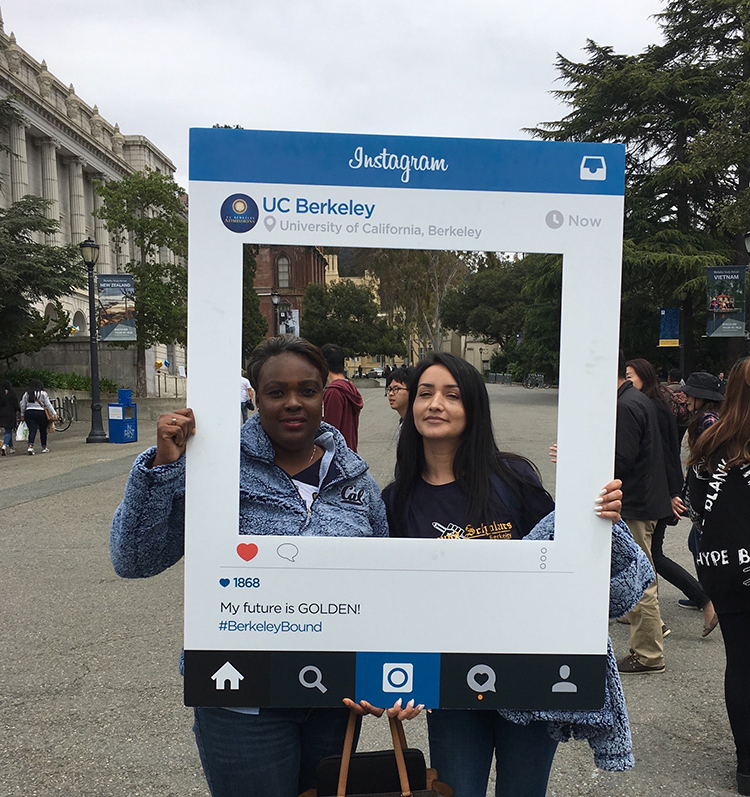
Aminah Elster and Daniela Medina at UC Berkeley’s 2018 welcome event for new transfers. (Photo courtesy of Daniela Medina)
After accepting the plea, in January 2009, Elster was moved to Valley State Prison for Women in the Central Valley town of Chowchilla.
There, Elster began taking domestic violence survivors workshops to understand how the violence in her childhood attracted her to toxic and abusive relationships and diminished her self-worth.
To gain back her self-confidence, in 2010, Elster began leading workshops for other prisoners to express their own abuse through art, poetry and music. She also facilitated discussions, sharing her story, and met Aviva Galpert, a legal advocate for Justice Now, an organization that works with and is led by people incarcerated in California’s women’s prisons.

Elster, left, and Aviva Galpert at a meeting of the California Coalition for Women Prisoners in October 2017. (Photo courtesy of Aviva Galpert)
“(Elster) is one of the most compassionate, thoughtful, intellectually curious, dedicated and brilliant people I’ve ever met, and I feel so fortunate to know her,” said Galpert. “She’s an emblem of what we can be when we try to do our best by other people.”
Elster enrolled in Feather River College, a community college that offers transferrable correspondence courses for incarcerated students. In 2012, after being on a waiting list for two years, Elster and fellow prisoner Daniela Medina began taking liberal arts and general education courses.
That same year, UC Berkeley’s Underground Scholars Initiative was created by a small group of formerly incarcerated students. As a leadership component of Berkeley’s Underground Scholars organization, the initiative helps formerly incarcerated prisoners like Elster find a path from prison to college.
Elster and Medina were surprised that formerly incarcerated students attended Berkeley because its prestigious reputation.
“We’re both from Oakland so we always held Berkeley up in such a high regard,” said Medina. “It was also closer to our family neighborhoods than other universities. Getting accepted to Berkeley was a dream that kept us going, kept us moving forward in a positive direction.”
“It was Berkeley or bust, from that point on,” said Elster.

Aminah Elster, third from the right, with members of the Underground Scholars community, celebrating Daniela Medina’s graduation last year with political activist Angela Davis, fourth from the left. (Photo courtesy of Azadeh Zohrabi)
The pair became engrossed in their academics, holding each other accountable for homework deadlines and carrying flashcards around the prison yard, to quiz each other in English, science and French.
Elster said through their studies she was able to “see the landscape outside of prison,” and where she could fit in.
In 2014, Elster and Medina earned associate degrees from Feather River College, and Medina was also released from prison. Within a few years she was accepted to Berkeley.
Seeing her friend succeed, Elster knew she was next.
“I told myself, ‘There’s no way God’s purpose for me is to spend the rest of my life in prison.’ I refused to believe that,” said Elster.
At her first parole hearing, Elster’s good behavior and academic success impressed the parole board. After 14 years in prison and jail, she was released in August 2017 and had already completed her application to UC Berkeley and made connections with Underground Scholars, a campus group that helps formerly incarcerated students find a home at Berkeley.
By the fall of 2018, she was attending Berkeley as a third-year student. She was 40.
The transition, and her unfamiliarity with academic jargon and in-class discussions, was difficult at first. In classes with students in their late teens and 20s, Elster also said she had imposter syndrome, feeling she didn’t deserve to be at Berkeley.

Aminah Elster with her fellow Peter E. Haas Public Servant Leaders. (Photo courtesy of Ashley Kelly)
But she found a community with Berkeley Underground Scholars and participated in programs at Berkeley’s Public Service Center. In class, she learned to examine constitutional law and legal policies that helped her analyze her personal experiences and the structural inequities she has faced.
“We talked a lot about systemic issues that affect groups of people. And it has really helped me to realize that, just because I was in prison, or coerced into participating in this crime, I’m not just this bad person,” she said. “There are these systems put in place that push you into certain situations. … At any moment, it can happen to anybody.”
Meanwhile, Elster also attempted to reconnect with her son, who had been raised by her parents while she was in prison. There was still volatility in her relationships with family, especially with her mother, and her parents refused to let Elster have contact with her son.
That mother-daughter relationship is still strained, Elster said.
“When I look back now at my mother’s childhood, there are a lot of traumas that she may have suffered, like sexual assault when she was younger, and it showed in her violent outbursts and her abusive tendencies toward me,” said Elster. “Sometimes we just don’t know the things that people have gone through that make them destructive toward themselves and the people they love.”
An admirable duty
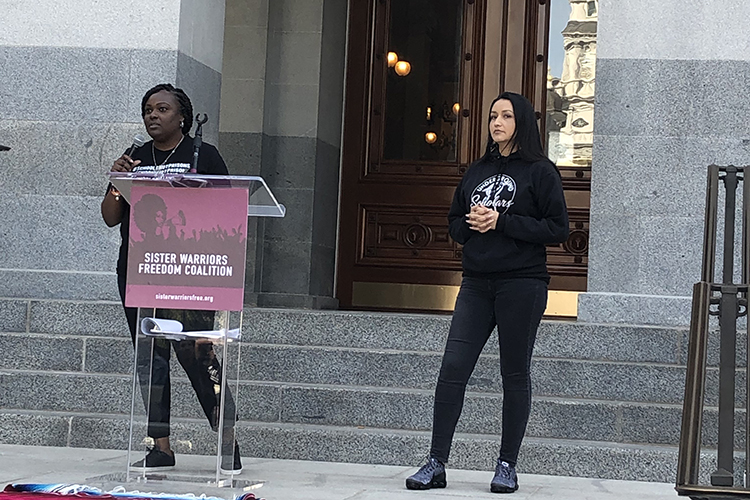
Berkeley Underground Scholars Aminah Elster, left, and Daniela Medina spoke at the state capitol about the importance of higher education during a March rally. (Photo courtesy of Daniela Medina)
In her final year at Berkeley, Elster was selected by Berkeley’s Public Service Center to be a member of the Peter E. Haas Public Service Leader Program.
As a Haas leader, Elster worked with her alma mater, Feather River College, to counsel women incarcerated in California prisons about how to transfer to a university and to realize, she said, that “being incarcerated is not the end of their lives.”
Berkeley’s Public Service Center program manager, Ashley Kelly, said Elster “has a strong presence among the students even if she is not speaking. She’s present, and there for everyone. That’s a particular leadership trait that I admire.”
As ambassador program coordinator for the Underground Scholars Initiative, Elster also has helped formerly incarcerated students to contribute to policy reports with Berkeley’s Institute for Research on Labor and Employment.
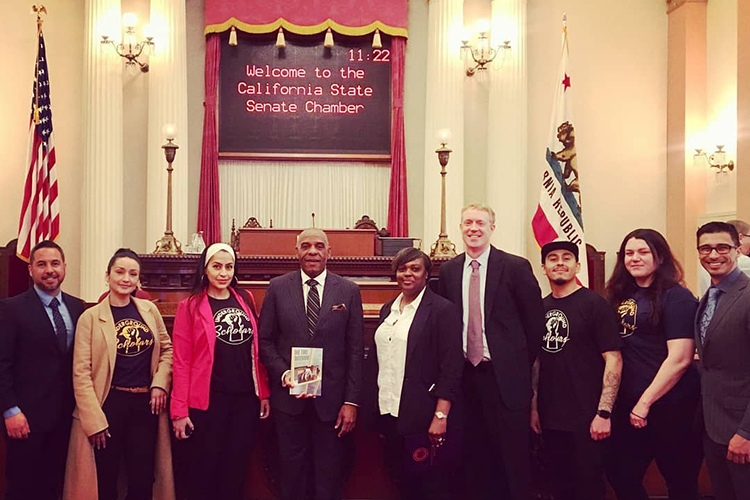
Aminah Elster, center, with her fellow Underground Scholars and California Senator Steven Bradford, fourth from left, on the senate floor. Elster testified for SB 575, which provides more pell grant funds for incarcerated students.
Through her leadership with the initiative, students have also learned how to craft their own stories to advocate for policy, including for the Ban-the Box campaign, a law that restricts an employer’s ability to ask about a criminal conviction on the job application, and the ACA 6 bill that aims to restore the voting rights of Californians on parole.
“I haven’t met a lot of people as well-rounded as Aminah,” said Berkeley Underground Scholars Director Azadeh Zohrabi. “She’s not afraid to stretch the boundaries of her comfort zone. I don’t see a lot of students with her level of professionalism and maturity. She’s really an incredible leader.”
Elster hopes to attend graduate school, but first is launching her own non-profit organization to equip former and currently incarcerated women in California with research skills so they can contribute to policy decisions that impact them.
Her goal is to keep giving voice to women whose shoes she was in just a few years ago and who also helped her, and each other, to grow and heal.
“It was truly life-saving for me,” she said. “And now, I want to make a difference for them.”